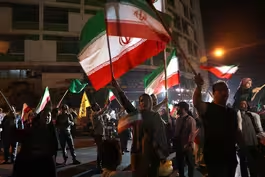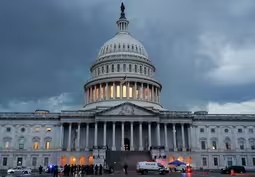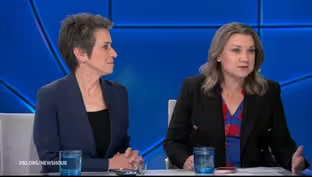
How Iran's response to U.S. signaled a desire to de-escalate
Clip: 6/23/2025 | 7m 35sVideo has Closed Captions
How Iran's response to U.S. strikes signaled a desire to de-escalate
Iran launched a barrage of ballistic missiles at a U.S. military base in Qatar, though also indicated a desire to de-escalate. President Trump is echoing that call and announced a ceasefire between Iran and Israel, which began this recent conflict when it attacked Iran and its nuclear program 12 days ago. Nick Schifrin reports.
Problems playing video? | Closed Captioning Feedback
Problems playing video? | Closed Captioning Feedback
Major corporate funding for the PBS News Hour is provided by BDO, BNSF, Consumer Cellular, American Cruise Lines, and Raymond James. Funding for the PBS NewsHour Weekend is provided by...

How Iran's response to U.S. signaled a desire to de-escalate
Clip: 6/23/2025 | 7m 35sVideo has Closed Captions
Iran launched a barrage of ballistic missiles at a U.S. military base in Qatar, though also indicated a desire to de-escalate. President Trump is echoing that call and announced a ceasefire between Iran and Israel, which began this recent conflict when it attacked Iran and its nuclear program 12 days ago. Nick Schifrin reports.
Problems playing video? | Closed Captioning Feedback
How to Watch PBS News Hour
PBS News Hour is available to stream on pbs.org and the free PBS App, available on iPhone, Apple TV, Android TV, Android smartphones, Amazon Fire TV, Amazon Fire Tablet, Roku, Samsung Smart TV, and Vizio.
Providing Support for PBS.org
Learn Moreabout PBS online sponsorshipGEOFF BENNETT: Welcome to the "News Hour."
It was a dramatic day in the Middle East.
Iran launched a series of ballistic missiles at a U.S. military base in the Middle East.
But it simultaneously indicated a desire to de-escalate.
And, this evening, President Trump announced a cease-fire between Israel and Iran, which began this recent conflict when it attacked Iran and its nuclear program 12 days ago.
Nick Schifrin starts our coverage.
NICK SCHIFRIN: Above Doha's skyline tonight, the first ever Iranian attack on the largest U.S. military base in the Middle East.
The U.S. says Iran fired more than a dozen short- and medium-range ballistic missiles at Al Udeid Air Base, nearly all intercepted and causing no casualties.
Al Udeid is usually home to more than 10,000 service members, but much of it was evacuated before tonight's attack, which Iran's Revolutionary Guard Corps broadcast, claiming complete success.
COL. IMAN TAJIK, Spokesman, Islamic Revolutionary Guard Corps (through translator): The Islamic Republic of Iran will not leave any act of aggression against its territorial integrity, sovereignty or national security unanswered under any circumstances.
NICK SCHIFRIN: But Iran warned Washington and Qatar before the attack.
It did not try to choke off global oil supplies, nor did it to try to strike any other U.S. base in the region.
And it signaled a desire for de-escalation, saying in a separate statement, it used the -- quote -- "same number of missiles as the number of bombs the United States used in attacking Iran's nuclear facilities," even if that claim was inflated.
At the White House, after meeting with his national security team, President Trump called Iran's response -- quote -- "very weak" and wrote: "I want to thank Iran for giving us early notice, which made it possible for no lives to be lost and nobody to be injured.
Perhaps Iran can now proceed to peace and harmony in the region.
And I will enthusiastically encourage Israel to do the same."
As of this morning, that was not what Israel was signaling.
Smoke towered over Tehran's tallest buildings after what Israel called its most widespread airstrikes on Tehran, including symbols of Iran's theocratic power.
In Northern Tehran, an airstrike hit the gates of the notorious Evin prison, which holds many domestic and foreign political detainees.
Israel also said it struck the headquarters of the IRGC in Tehran and of the Basij, the regime's paramilitary troops who enforce the silencing of all dissent.
Analysts say today's attack is a message to Iranians who want to protest their government, they should feel free to do so.
IDF spokesman Brigadier General Effie Defrin: BRIG.
GEN. EFFIE DEFRIN, Israeli Defense Forces Spokesperson (through translator): The internal security forces are a significant part of the security and immunity of the Iranian regime.
We will continue to target every component and layer of the regime that is involved in activities that threaten the state of Israel.
NICK SCHIFRIN: Israel today also struck the access route to the Fordow enrichment site, where this weekend the U.S. dropped a dozen bunker-buster bombs that entered two precise sites before exploding deep underground.
Today, the head of the U.N.'s nuclear watchdog said the U.S. attack appeared to be successful.
RAFAEL GROSSI, Director General, IAEA: Given the explosive payload utilized and the extreme vibration-sensitive nature of centrifuges, very significant damage is to have occurred -- is expected to have occurred.
GEOFF BENNETT: And our Nick Schifrin joins us now.
So, Nick, let's talk about this newly announced cease-fire.
What more do you know?
NICK SCHIFRIN: President Trump posted that the cease-fire would start about midnight tonight Eastern, so in the morning in Iran and Israel, that Iran would start a 12-hour cease-fire.
President Trump said then Israel would start a 12-hour cease-fire.
So, in 24 hours, there would be a complete cease-fire.
And, at that point, he said - - quote -- "The war would be ended."
It would be declared the 12-day war.
Now, I just checked with Israeli officials.
There's no confirmation of this at this hour.
But, presumably, this is the agreement that has been set by Israel with President Trump, and the Iranians have agreed to this.
President Trump wrote: "This could have gone on for years, but didn't."
The assessment of the -- quote -- "12-day war," if that actually catches on, from Israel's perspective, will be a severe degradation of Iran's nuclear capacity and missile capacity as well, and a demonstration, perhaps, as we have been talking, Geoff, by the IDF that they can reach into Israel and attack regime targets that go beyond nuclear and missile sites.
But perhaps the lasting legacy for Israel of this 12-day war, again, if that name holds, is that the United States got into it, and that specifically the degradation that only a U.S. weapon could do, that 30,000-pound bomb dropped by a B-2 bomber, 12 of them on Fordow enrichment site, two of them as well on Natanz, 30 more missiles at Isfahan, that is something that Israel could not do.
And so the legacy of this 12 days is that Israel will have gotten the United States into this war, and the U.S. did something that only the U.S. could do, really degrade the program that the U.S. believes is now set back by years.
GEOFF BENNETT: And the vice president this evening, Nick, J.D.
Vance, he gave an interview where he shared more details about that U.S. attack.
What did he have to say?
NICK SCHIFRIN: So he spoke to FOX just a few minutes ago on the East Coast.
And he said that Iran was -- quote -- now "incapable" of building a nuclear weapon with the equipment that it had because the U.S. had destroyed it and -- quote -- "obliterated it."
There will be a debate about whether he is accurate about that.
But what he is talking about is the U.S. claim or assessment right now that the Iranian program that uses centrifuges to spin fuel, to create highly enriched uranium, which has created 60 percent uranium, which is one step below 90 percent weapons-grade, they no longer have either the access to those centrifuges or those centrifuges have been broken beyond repair.
That was his word.
His word is that -- and then, separately, he said, the stockpile is buried.
Why that is important is that, if Iran were to use what it has now to try and create a nuclear bomb, it would need that 60 percent highly enriched uranium.
What Vance is saying tonight is that stockpile is actually buried.
What he also said is that this is a new opportunity to pursue peace.
And that is what we have been discussing also.
Could this moment lead to some kind of new negotiation?
It certainly could.
Iran has been saying that it was willing to negotiate if Israel stops.
So that box is checked.
However, before Israel's campaign started 12 days ago, there was a deadlock.
The United States was demanding that Iran give up any domestic enrichment, and instead go to some kind of regional consortium, where they would import the nuclear fuel, import the uranium.
Iran was insisting that it domestically enrich.
And, in fact, that insistence, they repeated just in the last few days after all of these attacks.
So if there is an opening for negotiations with the war ending, then that's fine, but the deadlock, Geoff, that existed two weeks ago still remains.
GEOFF BENNETT: Nick Schifrin, our thanks to you for that reporting.
NICK SCHIFRIN: Thank you.
Murkowski on new memoir and adapting to Trump era politics
Video has Closed Captions
Clip: 6/23/2025 | 9m 22s | Sen. Murkowski on new memoir 'Far From Home' and adapting to Trump era politics (9m 22s)
News Wrap: Supreme Court allows deportations amid appeals
Video has Closed Captions
Clip: 6/23/2025 | 6m 12s | News Wrap: Supreme Court allows deportations of migrants to countries other than their own (6m 12s)
NYC mayoral primary could forecast the future for Democrats
Video has Closed Captions
Clip: 6/23/2025 | 8m 29s | New York City mayoral primary could forecast the future for Democrats (8m 29s)
Retired U.S. vice admiral analyzes Iran conflict
Video has Closed Captions
Clip: 6/23/2025 | 6m 50s | Retired U.S. vice admiral analyzes Iran conflict and what's next (6m 50s)
Some Republicans clash with Trump over Iran strikes
Video has Closed Captions
Clip: 6/23/2025 | 4m 37s | Some Republicans in Congress clash with Trump over Iran strikes (4m 37s)
Tamara Keith and Amy Walter on impact of conflict with Iran
Video has Closed Captions
Clip: 6/23/2025 | 9m 15s | Tamara Keith and Amy Walter on the political impact of the conflict with Iran (9m 15s)
Providing Support for PBS.org
Learn Moreabout PBS online sponsorshipSupport for PBS provided by:
Major corporate funding for the PBS News Hour is provided by BDO, BNSF, Consumer Cellular, American Cruise Lines, and Raymond James. Funding for the PBS NewsHour Weekend is provided by...

















